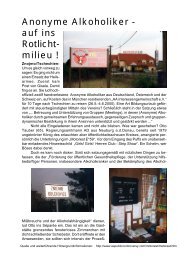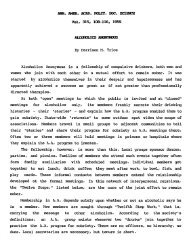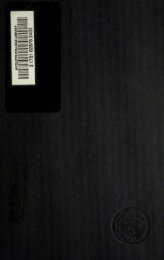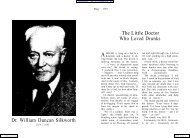The Philosophy of Courage - Alcoholics Anonymous. AA, Meeting ...
The Philosophy of Courage - Alcoholics Anonymous. AA, Meeting ...
The Philosophy of Courage - Alcoholics Anonymous. AA, Meeting ...
- No tags were found...
Create successful ePaper yourself
Turn your PDF publications into a flip-book with our unique Google optimized e-Paper software.
FOREWORDby Glenn F. ChesnutPhilip Leon finished writing <strong>The</strong> <strong>Philosophy</strong> <strong>of</strong> <strong>Courage</strong> in December 1938, witha publication date in 1939. 1 So it was not a direct influence on the Big Book <strong>of</strong> <strong>Alcoholics</strong><strong>Anonymous</strong>, which was completed (basically anyway) slightly before thatpoint, a bit earlier in 1938. But Leon puts down in print some <strong>of</strong> the most important<strong>of</strong> the Oxford Group ideas which had so greatly influenced the early A.A. people,and he also gives an illuminating philosophical discussion <strong>of</strong> a number <strong>of</strong> the basicideas and principles which A.A. learned from the Oxford Group. As a consequence,people in the twelve step movement will find a good deal <strong>of</strong> interesting and veryuseful material in Leon’s book.Leon was associated with one <strong>of</strong> the new British universities—University College,Leicester—which had been founded right after the First World War. <strong>The</strong> city<strong>of</strong> Leicester is located right in the center <strong>of</strong> England, only sixty miles or so from Oxford.Three years earlier, he had written a very successful philosophical work called<strong>The</strong> Ethics <strong>of</strong> Power or <strong>The</strong> Problem <strong>of</strong> Evil (London : George Allen & Unwin, 1935). 2NOTES ON THE INTRODUCTION<strong>Courage</strong><strong>The</strong> title <strong>of</strong> the work we are looking at here—<strong>The</strong> <strong>Philosophy</strong> <strong>of</strong> <strong>Courage</strong>—is significantin itself. It places Philip Leon, in his own way, in the context <strong>of</strong> the famousexistentialist philosophers and theologians <strong>of</strong> that period. Most <strong>of</strong> those figureswere, like Leon, reacting to the ideas <strong>of</strong> the German philosopher Immanuel Kant(1724-1804) and his nineteenth century followers. Kantianism proclaimed that ourhuman minds were imprisoned in a box <strong>of</strong> space and time, where we had no accessto the eternal, absolute, unlimited, and unconditional divine realm which layoutside the box.<strong>The</strong> atheistic existentialists said that all that lay outside that box <strong>of</strong> space andtime was an infinite abyss <strong>of</strong> Nothingness, and that even within the world whichour human minds could grasp, human existence was absurd, and the only certaintywe could state was that our lives were inexorably lived towards death. <strong>The</strong> closesthuman beings could come to living with dignity was to face the absurdity and deathwith resolution and courage. Philosophers and writers like Nietzsche (1844-1900), Sartre(1905-1980), and Camus (1913-1960), along with existentialist psychiatrists likeFritz Perls (1893-1970), all saw our basic human problem as one <strong>of</strong> fear: the fear<strong>of</strong> emptiness and death, but also the fear <strong>of</strong> change and novelty, and above all the2















